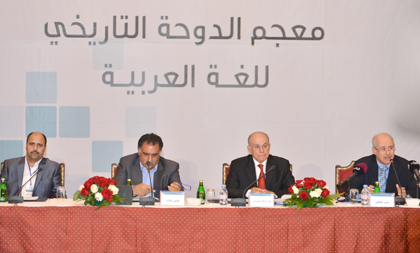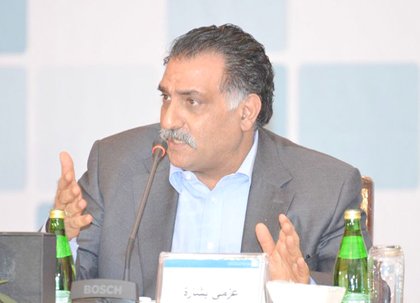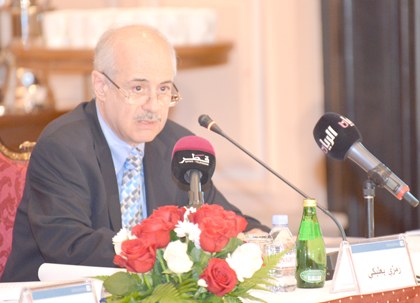 The Arab Center for Research and Policy Studies announced the official launch of the Doha Historical Dictionary of Arabic , on May 25, 2013, following two years of extensive preparation by a select group of linguistic experts, lexicographers, and computational scientists from a variety of Arab countries. The official announcement was made at Doha's Ritz-Carlton, where the first meeting of the academic council responsible for the project was held. ACRPS General Director Dr. Azmi Bishara passed the chair of the first session to Dr. Ramzi Baalbaki.
The Arab Center for Research and Policy Studies announced the official launch of the Doha Historical Dictionary of Arabic , on May 25, 2013, following two years of extensive preparation by a select group of linguistic experts, lexicographers, and computational scientists from a variety of Arab countries. The official announcement was made at Doha's Ritz-Carlton, where the first meeting of the academic council responsible for the project was held. ACRPS General Director Dr. Azmi Bishara passed the chair of the first session to Dr. Ramzi Baalbaki.
During the meeting, they also announced the launching of a temporary website for the lexicon, hosted on the ACRPS domain for the time being:
http://www.dohainstitute.org/dohadictionary
The Doha Dictionary project will provide the Arab nation with the means to understand its language, as well as their language's historical and civilizational legacy. By bringing the past to the present, the Doha Dictionary contributes to the building of a more promising Arab future. The project itself is sponsored by His Highness the Heir Apparent of Qatar, Sheikh Tamim Bin Hamad Al-Thani.
 The new dictionary, which will chronicle the history of Arabic terms over 2,000 years, is projected to take 15 years until completion, with achievement highlights being presented every three years. The dictionary hopes to make possible the facilitation of research on Arab intellectual legacy through the work it uncovers. As a comprehensive electronic corpus, the dictionary will be able to assist a number of projects related to machine language in Arabic, including machine translation and automated spelling and grammar checkers. A number of specialist lexicons will also be published as auxiliaries to the main project, including dedicated works on scientific terms, terms related to the study of civilization, a complete dictionary of contemporary Arabic, and educational dictionaries.
The new dictionary, which will chronicle the history of Arabic terms over 2,000 years, is projected to take 15 years until completion, with achievement highlights being presented every three years. The dictionary hopes to make possible the facilitation of research on Arab intellectual legacy through the work it uncovers. As a comprehensive electronic corpus, the dictionary will be able to assist a number of projects related to machine language in Arabic, including machine translation and automated spelling and grammar checkers. A number of specialist lexicons will also be published as auxiliaries to the main project, including dedicated works on scientific terms, terms related to the study of civilization, a complete dictionary of contemporary Arabic, and educational dictionaries.
In his comments to the participants, Dr. Bishara affirmed the importance of the Doha Historical Dictionary, describing the project as the "dream of generations for Arab linguists and scholars, and even Orientalists". He emphasized that the project's role is "Arab-wide" and not intended to preserve a single Arab country. With its examinations on the etymology and meaning of Arabic terms, the dictionary is a project that aims to bring the development of the Arabic language in line with history.
"It is a shame that a nation with such a rich historical and civilizational legacy as ours does not already possess a comprehensive, historical dictionary. While the first step may be the most important, completing the project is a duty, given the distinguished group of experts and scholars from various Arab countries. This diversity reflects how the entire Arab world is represented, holistically, and not on a country-by-country basis: none of the participating scholars is a representative of an individual country, but joins in an Arab capacity."
 Dr. Baalbaki, head of the project's academic council, spoke of the sincerity of the dictionary's beginnings, and of the features he feels, "bode well for the future". According to Baalbaki, these are:
Dr. Baalbaki, head of the project's academic council, spoke of the sincerity of the dictionary's beginnings, and of the features he feels, "bode well for the future". According to Baalbaki, these are:
1) The earnest and confident leadership shown by Dr. Bishara, who is the project's driving force;
2) The team of professionals who drove the idea forward, including the administrative and academic staff;
3) The Arab scholars and experts who were chosen for their expertise and academic caliber to be a part of this project.
He also pointed out how the funding, provided generously by the State of Qatar through the Heir Apparent Sheikh Tamim, was the backbone that made completion of the project possible. This support was provided as part of Qatar's wider efforts to bolster a common Arab identity, and its encouragement of a sense of belonging to a wider Arab nation.
Following Baalbaki, Dr. Aze-Eddine Bouchikhi, the project's executive director, began describing the nature of the project, its importance, and the value it would add. He further likened the process of creating the etymological work to the creation of a "linguistic memory" for the Arab nation. Such a linguistic memory, he said, would also serve as a memory of thought within the same nation. A historical approach to the chronicling of this memory, he said, would provide for an easier reading of the phases through which the Arab nation passed over the past 20 centuries. Such a chronicle would make it easier to understand the Arabs' intellectual and scientific heritage through parsing out the meanings of the phrases used, in their historical and cultural contexts. Bouchikhi closed his statement by saying that the Arab nation would know themselves "better than we ever have before" after the dictionary's completion. He further thanked the committed scholars who are making the dictionary possible, singling out Dr. Bishara. Finally, he praised the support the project has received from Qatar, specifically from the Heir Apparent Sheikh Tamim, remarking how the name "Doha Historical Dictionary of Arabic" would serve to highlight the participants' gratitude for Qatar's generous support.
Participants of the Academic Council for the Doha Historical Dictionary of Arabic
|
Participant name
|
Affiliation
|
|
Azmi Bishara
|
General Director, Arab Center for Research and Policy Studies, Doha
|
|
Ramzi Baalbaki
|
American University of Beirut, Beirut, Lebanon
|
|
Abdessalam Massadi
|
Previously of the University of Tunis
|
|
Ibrahim Ben Mourad
|
Manouba University, Tunisia
|
|
Hassan Hamzeh
|
Universite Lyon II, Lyon, France
|
|
Ali Ahmad al-Kubaisi
|
Qatar University
|
|
Al Chahed al-Bouchikhi
|
Previously of Mohammed V University, Fez, Morocco; Director of the Mubdi' Institute, Fez, Morocco
|
|
Abdelkader al-Fassi al-Fahri
|
Previously of Mohammed V University, Rabat, Morocco
|
|
Abdulali al-Wadgheeri
|
Previously of Mohammed V University, Rabat, Morocco
|
|
Elias Atallah
|
Haifa University, Palestine
|
|
Nihad al-Mousa
|
Previously of the University of Jordan
|
|
Mohammed Hassan Jabal
|
Previously of the University of Cairo, Egypt
|
|
Mahmoud Fahmi Hijazi
|
Previously of the University of Cairo, Egypt
|
|
Ahmad al-Dabeeb
|
Previously of King Saud University, Riyadh, Saudi Arabia
|
|
Latifa al-Najjar
|
United Arab Emirates University, Al Ain
|
|
Siham al Furaih
|
Kuwait University
|
|
Mohammed Hassan al-Tayyan
|
Arab Open University, Kuwait
|
|
Ali Mohammed al-Mikhlafi
|
Sanaa University, Yemen
|
|
Abdulhameed al-Harama
|
Arab Language Academic, Tripoli, Libya
|
|
Ismail Amaera
|
Amman University, Jordan
|
|
Ali Al Qassemi
|
Member of the Council
|
|
Aze-Eddine Bouchikhi
|
Qatar University
|
|
Mohammed al-Obaidi
|
Qatar University
|
|
Rachid Belhabib
|
Qatar University
|